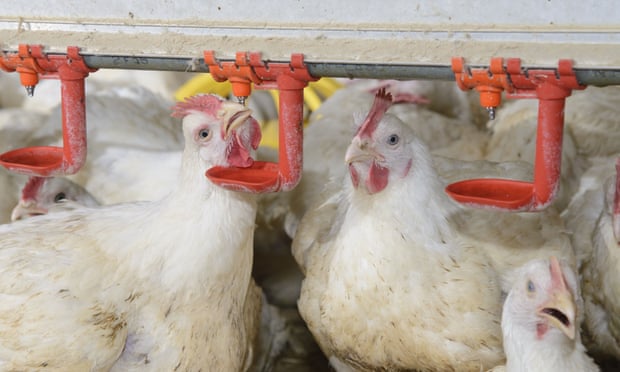More than a million meat chickens are dying every week in the UK before reaching slaughter weight, according to a new report.
An analysis of government figures by the animal welfare charity Open Cages reveals about 64 million chickens die prematurely each year in the UK. The dead birds can be incinerated or rendered into usable materials such as protein meal.
Chris Packham, the broadcaster and conservationist, said: “I think consumers would be utterly disgusted to know that a million of these intelligent, sensitive birds are dying every week to get cheap chicken on to their plates.
“The utter misery these animals face on a daily basis is unnecessary and would outrage even the most ardent meat-eaters because it serves no purpose but to satisfy the profits of our major supermarkets, who refuse to help them.”
Animal welfare campaigners say the mortality rates could be significantly reduced by better welfare standards. They are urging retailers to support the Better Chicken Commitment, an initiative to phase out fast-growing breeds and reduce stocking density.
Welfare experts say the modern chicken is genetically bred to grow so quickly that it can put a strain on its body, increasing the risk of cardiac arrest.
Research has shown that fast-growing chickens which reach their kill weight in just 35 days can have higher mortality, lameness and muscle disease than slower growing breeds. One of the most common causes of death in flocks is heart failure, or sudden death syndrome.
Connor Jackson, chief executive of Open Cages, which has produced the new report, said: “The supermarkets sell food with advertisements of animals in green fields but never show broiler chickens in sheds. It’s appalling that the supermarkets continue to sell these fast-growing breeds.”
While all the major retailers in France have signed the Better Chicken Commitment, it is not yet supported by the biggest supermarkets in Britain. Its backers to date include Marks & Spencer, Waitrose, Pret, KFC and the food service company the Compass Group. Sainsbury’s announced in April that its fresh chicken would be bred with 20% more space than the UK standard by March 2023.
The British Poultry Council, the trade group for the industry, said: “Our birds are the most valuable part of production so we are working incredibly hard to minimise the level of mortality in the process, which is averaging at around 4%..
“We use a variety of production systems, including Better Chicken Commitment, according to the demand of consumers. It has a higher environmental impact and cost of production, so it currently makes up only 1%one percent of the market. We are an industry driven by consumer preference.”
Andrew Opie, director of food and sustainability at the British Retail Consortium, said: “Our members take their responsibilities to animal welfare very seriously, and they ensure it is a key part of the production standards for all the meat they sell.
“Retailers already give consumers the choice of how their chicken is reared, including free-range and organic chicken, in addition to the standard range.”
A Defra spokesperson said: “All farm animals are protected by comprehensive and robust animal health and welfare legislation. We welcome the fact that many businesses have already signed up to the Better Chicken Commitment and encourage others to do so. We are exploring how government can better support this best practice.”
… as you’re joining us today from Italy, we have a small favour to ask. Tens of millions have placed their trust in the Guardian’s fearless journalism since we started publishing 200 years ago, turning to us in moments of crisis, uncertainty, solidarity and hope. More than 1.5 million supporters, from 180 countries, now power us financially – keeping us open to all, and fiercely independent.
Unlike many others, the Guardian has no shareholders and no billionaire owner. Just the determination and passion to deliver high-impact global reporting, always free from commercial or political influence. Reporting like this is vital for democracy, for fairness and to demand better from the powerful.
And we provide all this for free, for everyone to read. We do this because we believe in information equality. Greater numbers of people can keep track of the events shaping our world, understand their impact on people and communities, and become inspired to take meaningful action. Millions can benefit from open access to quality, truthful news, regardless of their ability to pay for it.

Nessun commento:
Posta un commento